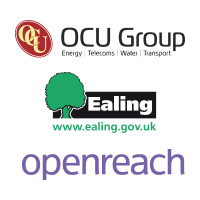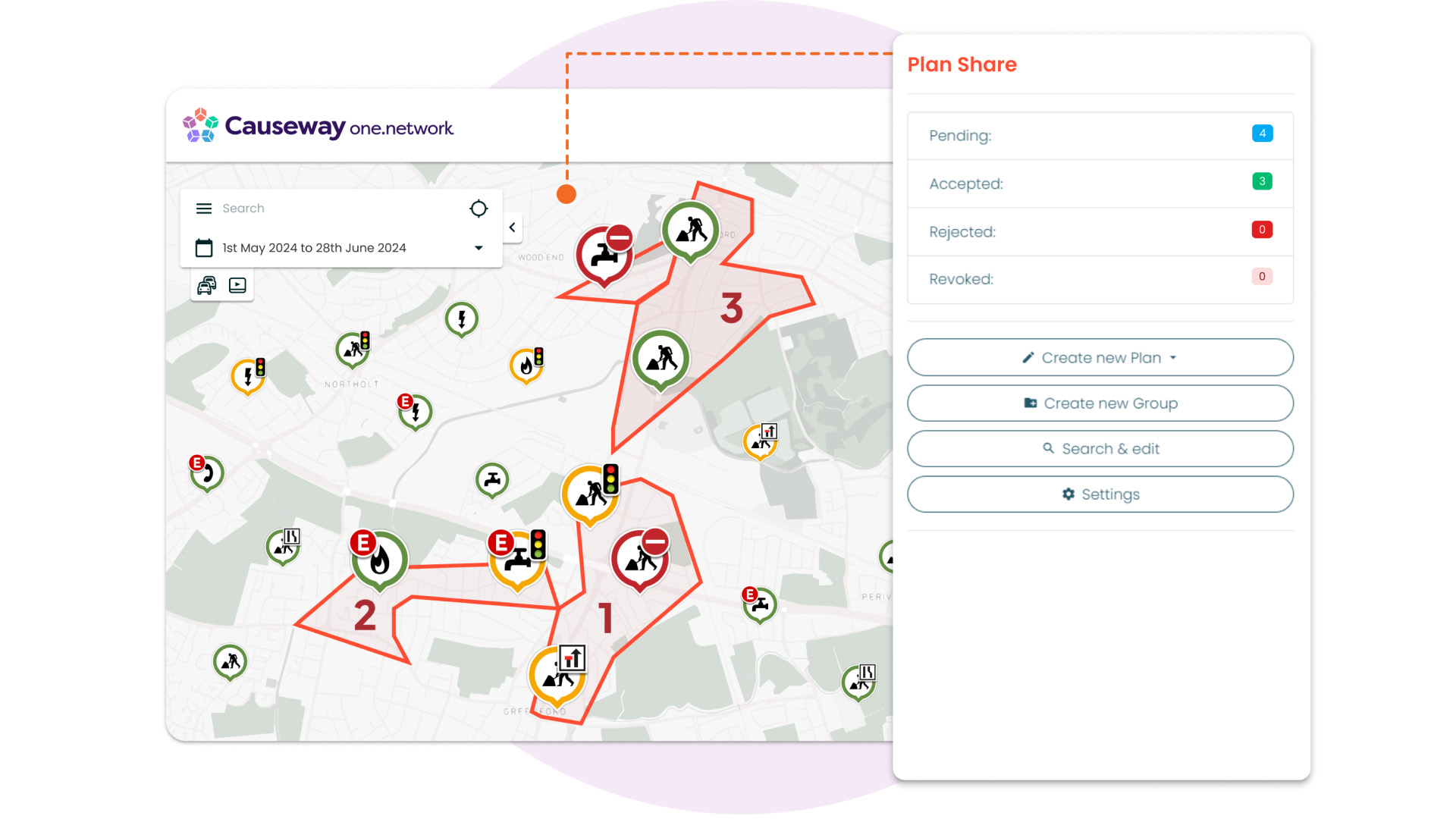Openreach manages and maintains the UK’s biggest broadband network, connecting more than 28.6 million homes and businesses. This network is rapidly expanding to support the UK’s Project Gigabit initiative, which aims to deliver faster and more reliable broadband nationwide. Achieving this goal requires extensive street works, a task for which OCU Group (OCU) is well-equipped. As leading utility contractors in the industry, OCU is partnering with Openreach to facilitate the rollout of full fibre connections across the UK.

The Challenge & The Solution
OCU Group (OCU) and Openreach had plans to install full fibre broadband across the London Borough of Ealing, with aims to connect 3,500 homes in Greenford and 1,000 in South Harrow between April and June 2024.
Covering a wider, fixed geographical area, Flexi Permits give utilities and contractors, like OCU and Openreach, the power to work across multiple streets at the same time and reduce the number of individual permits that need to be submitted and approved.
Together, OCU, Openreach and Ealing Highways decided to trial Causeway one.network to collaborate on planning and coordinating the Flexi Permits for the fibre roll out project.
The platform allowed all three parties to work from a single, shared, digital, map-based dashboard to plot and coordinate three Flexi Permits across May and June 2024.
With the Plan Share solution, OCU was able to submit the permits and traffic management plans directly to Ealing Highways within Causeway one.network, where Ealing could review, amend and approve the permits, and communicate with OCU via chat.
Through Plan Share, OCU successfully submitted permits and traffic management plans directly to Ealing Highways via Causeway one.network. It allowed Ealing to review, modify, and approve the permits, while facilitating real-time communication with OCU via the chat functionality.
32% network occupancy reduction
or, a 19 working day saving for OCU.
9 hours saved on permit planning
more than an entire working day saved for OCU.
Zero modifications or refusals
saving time & resource for OCU & Ealing Highways.
125% THP efficiency increase
with 4500 homes connected in just 8 weeks.
36 USRNs in 41 working days
contrasting the standard 60 working days.
62.5% reduction in carbon emissions
with 1753.5kg less CO2 emitted.
"Using Flexi Permits has allowed OCU to operate more efficiently and connect more homes with the available resources in shorter timescales. This freed up resources to work on streets where traffic impacts are greater The results show that Flexi Permit schemes are workable and practical, and can lead to better coordination and successful network management of Fibre upgrade. In addition, it has shown that the reduction in CO2 targets goes a long way to reducing OCU Net Carbon Footprint."
OCU Group
The Results
The Flexi Permi trial produced some remarkable outcomes:
- 32% network occupancy reduction: All necessary street works were completed within 41 working days, compared to the average 60 working days for non-Flexi roll out projects. This is a saving of 19 working days.
- Zero variations, refusals or modifications: By collaborating on Causeway one.network to coordinate the flexi permits, OCU, Openreach and Ealing Highways streamlined the process, cutting down on the time, resources, and costs needed to review individual permits, resulting in 0 variations, refusals or modifications.
- 125% efficiency increase: By using Flexi Permits, OCU (on behalf of Openreach) was able to connect 4500 homes within 8 weeks, compared to 12 weeks for the 3000 homes in neighbouring highway authorities where flexi permits were not used. This equates to 562 homes per week, contrasting the typical 250, marking a 125% increase in efficiency.
- 36 USRNs covered within 41 working days: 36 USRNs were covered across the three flexi permits in 41 working days, including civils and cabling. Working with standard statutory permit processes, it would have taken 60 days to cover the same number of USRNs.
- 62.5% reduction in carbon emissions: With the ability to walk and work across multiple streets simultaneously, the OCU works crew was able to reduce the number of miles driven and as a result, carbon emissions. During the Flexi Permit project, the crew drove only 1756.6 miles. This burnt 457.7 litres of diesel, emitting 1052.8kg of CO2. In comparison, analysis of business as usual in the month following the project showed 4567.2 miles were driven, burning 1220.01 litres of diesel and emitting 2806.3kg of CO2. That’s a 62.5% reduction in carbon emissions.
Causeway one.network was instrumental in these achievements. The digital platform facilitated seamless collaboration between OCU, Openreach and Ealing Highways, unlocking the following benefits:
9 hours saved on permit planning and strengthened working relationships
Coordinating permits together via Causeway one.network strengthened the working relationships between OCU, Openreach and Ealing Highways by ensuring everyone had a shared operational view of the network.
In addition, the platform also enabled OCU to save significant time and resource when creating permits and traffic management plans.
Creating and planning a single flexi permit on Causeway one.network took OCU 35 minutes, equating to 1 hour and 45 minutes for all three flexi permits. There were then 20 retrospective permits that needed registration: each took 7 minutes, resulting in a total planning time for OCU of 4 hours and 5 minutes. For comparison, in the four-week period after the Flexi Permit project concluded, OCU spent a total of 11 hours and 24 minutes planning permits. This shows a time saving of over 9 hours – more than one entire working day.
Mark Reilly, Street Works Manager at Ealing Highways said:
"The delivery of high-speed fibre broadband using existing Openreach infrastructure is the type of project that is ideally suited to a flexi permit. Early engagement, coupled with the principles of the flexi permit, has meant that the time spent coordinating other utility and borough work was sigificantly less than it would have been under the standard permit scheme."
Boosted collaboration on street works sites and reduced network disruption
Using Flexi permits and publishing the plans on Causeway one.network increased transparency for other works promoters in the area, enabling easy identification of collaborative working opportunities. This meant multiple works promoters were able to work under the same permit at the same time, further reducing disruption for road users.
Zero complaints or public enquiries during the project
Publishing the flexi permit plans on the Causeway one.network map enhanced visibility for the public. With foreknowledge of the permits and potential disruption, residents and road users could plan their journeys in advance. This, alongside fostered familiarity with the works crews throughout the flexi period, resulted in elevated resident satisfaction levels and zero complaints or public enquiries about the project.
Future Aspirations
Following the success of the Flexi Permit project, OCU Group is keen to conduct additional trials to collect extensive data and investigate the application of flexi permits on traffic sensitive streets.
OCU is also working to refine the procedure for broader implementation throughout all London boroughs and further afield, in North Somerset.
For further insight into how Causeway one.network can help streamline your permitting processes, get in touch.
